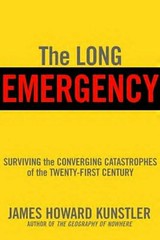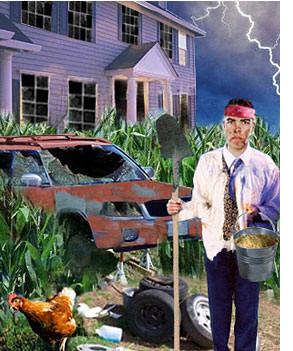PUERTO VALLARTA, Jalisco, Mexico - A friend of mine - familiar with what we are doing in Mexico - recommended a book to me called The Long Emergency, by James Howard Kunstler.
Thanks a lot, Randy... As if I needed more material for nightmares.
It's not a novel, or a work of fiction. But it is more frightening than anything Stephen King or Dean Koontz has pumped out. And it's unlikely they will be able to top it, unless they spin off what Kunstler has written.
Why? Well, because much of what he predicted is already happening, just a few years after the book was published.

Cover of The Long Emergency
The book's major premise is that we are running out of oil (no duh...) and that as that happens, most of what we know will either completely disappear or have to be transformed in ways that are not pretty. I've read some of this before, but not with such dramatic, clear analysis and portraits of what life is likely to be like for the balance of the century.
(Good luck my children and grandchildren.)
Take the suburbs. If there isn't enough oil to make gasoline - and gasoline for cars - how will people commute to work? Or shop. Or get to the doctor? Or? (Forget trains and buses, at least in the U.S. Our systems can't handle the few people who want to use they now.)
Kunstler's grim world is one in which we all will end up going back to the basics of agriculture and subsistence living. The job openings - maybe in just 20 or 30 years - will be for farm hands, not public relations practitioners.

American Gothic - in 2030?
More to the point, he also talks in detail about the entire house of cards built by most of the world in which we have been depleting resources at a rate so fast it makes you dizzy. He also talks about the U.S. housing situation that tipped the scale so neatly, catapulting the U.S. into its current downward spiral and recession.
Before you dismiss all of this with a wave of that magic wand that says 'alternative energy and new technologies will save us,' read his analysis of why that magic wand won't be nearly enough to save billions of people in the world from starving to death.
And for anyone who thinks government - that of the U.S. or any nation - will be able to keep life as we know it afloat, perhaps a listen to the short interview might convince you otherwise.
In case the book seems, well, a little too much to chew on, Kunstler also wrote a sort piece for Rolling Stone that sums up most of the themes of his book.
Sweet dreams, y'all
Here's the link to Rolling Stone:









No comments:
Post a Comment